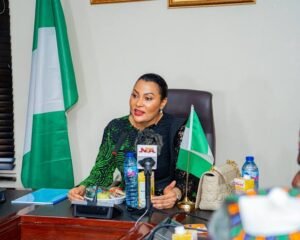President Bola Tinubu has emphasized the positive impact of fuel subsidy removal, revealing that funds previously spent on subsidies are now being redirected toward critical infrastructure, social welfare, and broad economic reforms. Speaking through the Minister of State for Finance, Dr. Doris Uzoka-Anite, at the National Conference on Public Accounts and Fiscal Governance in Abuja, the President reiterated that eliminating the fuel subsidy, although a difficult decision, was essential for long-term national prosperity.

Minister of State for Finance addressing fuel subsidy removal and economic reforms at a national conference
Tinubu noted that in 2022 alone, Nigeria expended over ₦4 trillion on fuel subsidy, a figure exceeding capital expenditure allocations for that year. He described the subsidy as inequitable and inefficient, primarily benefitting the affluent, fostering smuggling, and distorting the economy. “Removing fuel subsidy freed fiscal space and allowed the redirection of resources to projects that benefit the broader population,” he stated.
According to him, since the removal of fuel subsidy, government funds have been funneled into expanding social safety nets, boosting public transport, and financing vital infrastructure—moves aimed at enhancing Nigeria’s resilience to global economic shocks.
Tinubu stressed that fiscal discipline is the cornerstone of national development. He highlighted that transparency and accountability in managing public resources are non-negotiable, asserting that economic transformation cannot occur without sound fiscal governance. He also pointed to the enactment of new tax reforms designed to digitize revenue collection, broaden the tax base, and reduce compliance burdens for businesses, especially SMEs.
Fuel subsidy removal, Tinubu argued, is enabling the country to shift away from overreliance on oil revenues and build a diversified economy. He spotlighted government investments in sectors such as agriculture, renewable energy, digital services, manufacturing, and the creative economy.
He also referenced programs like the National Credit Guarantee Company, which aim to stimulate local production and enhance non-oil exports. These reforms, he said, are designed to foster innovation, create jobs, and ensure national stability.
On monetary policy, the President acknowledged improved coordination between fiscal and monetary authorities. He credited the Central Bank’s role in stabilizing the naira and reducing inflation, especially through structural interventions in food supply chains.
Tinubu further underscored the government’s move to digitize public financial systems via platforms like IPPIS, GIFMIS, and the Open Treasury Portal, aimed at ensuring the traceability of public funds and increasing accountability.
Calling on the National Assembly to intensify its oversight role, Tinubu described such accountability as essential to democracy and good governance. He urged Public Accounts Committees to act with courage and independence, stating that “every naira must reflect value for money.”
READ ALSO: CBN Denies Hidden Charges in $50 Non-Resident BVN Fee Clarification
Senate President Godswill Akpabio, represented by Senator Abdul Ningi, echoed these sentiments. He described fuel subsidy removal as a turning point and stressed that without transparency and effective oversight, Nigeria’s development would be stunted. Akpabio called on agencies to comply with legislative summons, warning that failure to do so undermines democratic accountability.
House Speaker Abbas Tajudeen, represented by Julius Ihonvbere, expressed concern over unresolved audit infractions, revealing that over ₦300 billion remains unrecovered from flagged public funds. He emphasized that fuel subsidy savings must be transparently managed and used to address long-standing infrastructural and fiscal deficits.
Tajudeen advocated for sanctions against ministries, departments, and agencies (MDAs) that ignore audit recommendations and stressed the importance of digital innovation in financial tracking. The House, he noted, is committed to real-time expenditure monitoring and increasing citizen participation in public budgeting processes.
Chairman of the Senate Public Accounts Committee, Senator Ahmed Wadada, called for a total overhaul of Nigeria’s fiscal governance, describing the end of the fuel subsidy regime as an opportunity to embed transparency and restore public trust. He stressed that the government must treat public resources as sacred, ensuring that every naira serves national development goals.
Wadada acknowledged audit lapses and urged reforms to strengthen oversight. He confirmed that the Senate, under Akpabio, is committed to prudent spending, legislative collaboration, and aligning with global standards in fiscal responsibility.
Chairman of the House PAC, Hon. Bamidele Salam, described the ongoing fiscal reforms—spurred in part by the removal of fuel subsidy—as foundational to building a more transparent and sustainable financial future. He urged participants of the conference to generate actionable outcomes and emphasized that the value of fiscal reforms must be measured by their impact on citizens’ lives.
Salam also identified key reform areas, including procurement transparency, audit integrity, and stronger civil society engagement. He emphasized that as Africa’s largest economy, Nigeria must lead the continent in accountability and fiscal innovation.
AFROPAC President Hon. Medard Sseggona praised Nigeria’s leadership in fiscal governance, stating that the country’s stance on fuel subsidy removal and its push for transparency signals a new era of responsible public finance in Africa. He encouraged the use of technologies like blockchain in procurement and digital audit tools to ensure real-time tracking of public spending.
Finally, Head of Civil Service, Mrs. Didi Walson-Jack, voiced strong support for the fiscal reform agenda, saying the current moment demands urgent and collective commitment to transparency, efficiency, and public service delivery.


